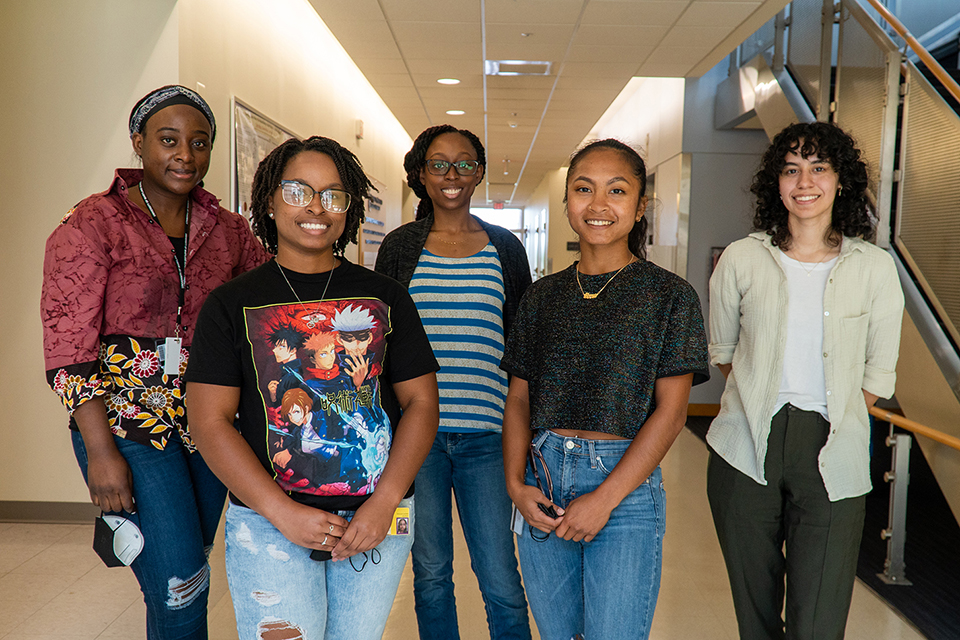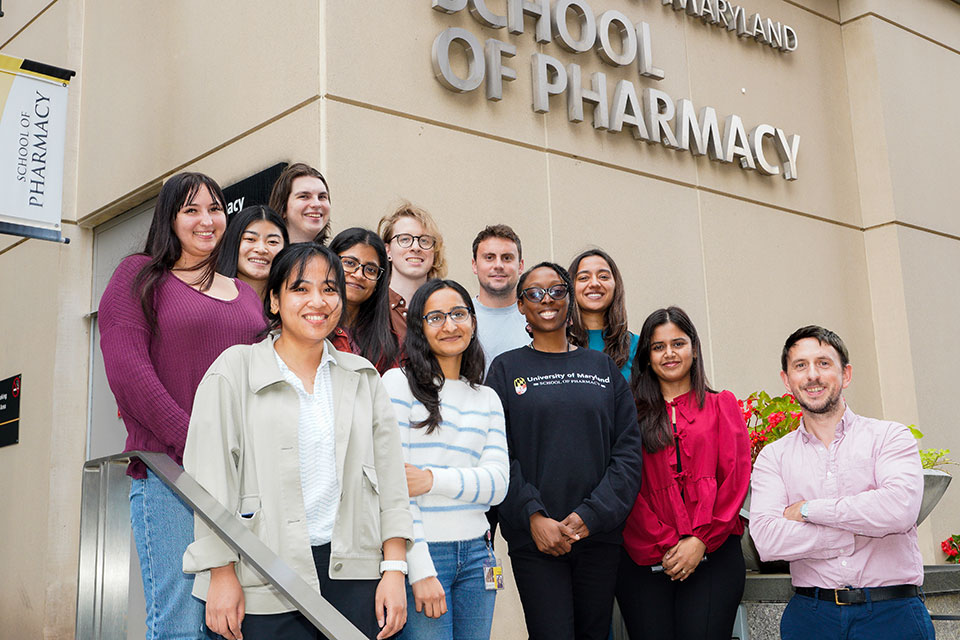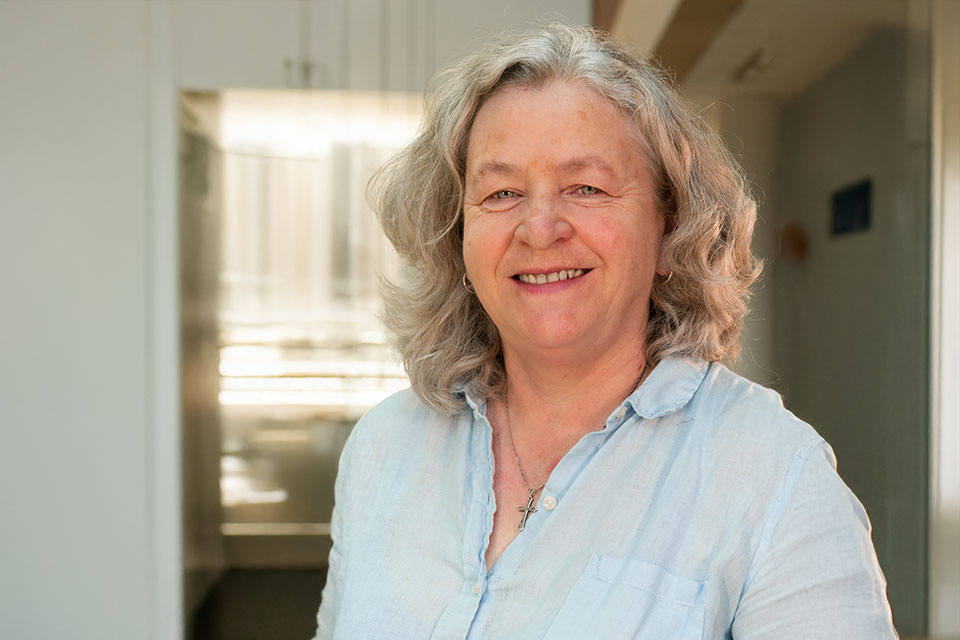SOP, SOM Awarded $1.1 Million Grant to Increase Diversity in Biomedical Workforce
Collaboration will help recruit, train, and mentor students from underrepresented groups.

By Andrew Tie
September 28, 2022
The National Institutes of Health (NIH) has awarded a $1.1 million grant to the University of Maryland School of Pharmacy (UMSOP) and the University of Maryland School of Medicine (UMSOM) to create a training program to enhance diversity in the biomedical workforce.
The five-year Initiative for Maximizing Student Development (IMSD) program strives to increase the number of students from underrepresented groups in the doctoral programs in UMSOP’s Department of Pharmaceutical Sciences (PSC) and UMSOM’s Graduate Program In Life Sciences (GPILS).
“I am exceedingly proud of this new initiative to enhance the numbers of diverse graduate students in the sciences at the schools of pharmacy and medicine and of what it means for the future of academia and research,” said Natalie D. Eddington, PhD, FAAPS, FCP, dean and professor at UMSOP. “As only the second African American to earn a PhD in pharmaceutical sciences at the School of Pharmacy, I fully support initiatives like ours that seek to break down barriers, provide access and support, and create opportunities for all students to succeed on their chosen career path.”
Increasing Diversity
The IMSD program’s goal is to train a diverse pool of PhD students across the biomedical research spectrum, which is why UMSOP and UMSOM are jointly hosting this program. Students will apply for admission to the graduate programs in PSC or GPILS. A team of faculty leaders from both schools will then select students for the IMSD training program, which will take 10 students per year — five in PSC and five in GPILS.
“This grant program affords us the opportunity to create a graduate school experience that is uniquely tailored to the needs of our students, in which they know that their opinions are respected, their cultural identities and connections are valued, and their intellectual curiosities are nourished,” said Mark T. Gladwin, MD, vice president for medical affairs, University of Maryland, Baltimore (UMB), and the John Z. and Akiko K. Bowers Distinguished Professor and dean at UMSOM. “Cultivating this type of inclusive academic environment is among our highest strategic priorities.”
“This award is not only an opportunity to increase the platform for underrepresented minorities on campus, but is also a chance to expose all our students to a diverse environment,” said Angela Wilks, PhD, the Isaac E. Emerson Chair of Pharmaceutical Sciences at UMSOP and one of four principal investigators (PI) of the grant. “We want to prepare our students to work in environments where diversity, equity, and inclusion are hallmarks of whatever they do.”
Mandy Oglesby, PhD, associate professor of PSC at UMSOP and PI of the grant, said she wants to help build a biomedical workforce that looks more like its community and the country.
“Diversity is incredibly important to the success of every industry,” Oglesby said. “When you have a diverse group of people working on a solution for a problem, you have more creativity and more representation in public health perceptions.”
Recruitment and Retention
Lisa Jones, PhD, a former faculty member at UMSOP who helped write the NIH proposal, says recruitment and retention are two major factors when it comes to diversification in biomedicine.
“Some students don’t think they can be scientists because of a lack of role models who look like them,” Jones said. “Our goal with the IMSD is to provide students with programming and mentoring to help them deal with issues that are unique to underrepresented populations.”
The IMSD grant aims to provide funding to address recruitment and retention gaps. It will cover first-year stipends for graduate students accepted into the program, conference travel, social events, and programming.
The grant also is directed by PIs Dudley K. Strickland, PhD, associate dean for graduate and postdoctoral studies and professor of surgery at UMSOM, and Tonya J. Webb, PhD, assistant director for diversity, equity, and inclusion and associate professor of microbiology and immunology at UMSOM.
“This grant program directly aligns with our mission of improving the human condition and serving our community, which highlights our strengths as a stellar research, educational institution, and a health care provider,” Webb said. “To me, to be a part of our students’ journey is amazing. It is a chance to be part of something great by helping create this protected space for the next generation of aspiring scientists to thrive, which is incredibly rewarding. I am grateful.”
Strickland said, “The awarding of this grant to UMB will allow us to continue to recruit and support the best and brightest students in the country with an objective of providing scientific training that will enhance and increase diversity in all fields of science.”
UMSOP and UMSOM are working collaboratively to develop the program’s content, which will be catered to the IMSD students, including workshops on topics as wide ranging as scientific writing to dealing with microaggressions to the various career tracks in the STEM fields. The grant is further supported by program administrators in each school — Kristina San Juan at UMSOP and Sharron Graves, DBA, at UMSOM.
The IMSD program emulates and derives from the University of Maryland, Baltimore County’s Meyerhoff Graduate Fellows Program, a multiyear IMSD partnership with UMB. Other institutions implementing the NIH’s IMSD program include the University of North Carolina at Chapel Hill, Emory University, and the University of Arizona.



